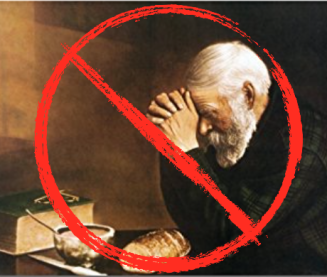 Last week the words of Rauschenbusch urged us to pray — a prayer of confession, not only for the sins that we commit but also for the sins of our fathers and the social constructs of which we are a part. This week, however, we want to ask the question, “What is prayer really good for?” Let’s go back to The Social Principles of Jesus, section III, of the chapter “Solidarity of the Human Family” to explore this question:
Last week the words of Rauschenbusch urged us to pray — a prayer of confession, not only for the sins that we commit but also for the sins of our fathers and the social constructs of which we are a part. This week, however, we want to ask the question, “What is prayer really good for?” Let’s go back to The Social Principles of Jesus, section III, of the chapter “Solidarity of the Human Family” to explore this question:
Does religion create social unity or neutralize it. Does prayer isolate or connect? Has the force of religion in human history done more to divide or to consolidate men?
Evidently religion may work both ways, and all who are interested in it must see to it that their religion does not escape control and wreck fraternity. Even mystic prayer and contemplation, which is commonly regarded as the flower of religious life, may make men indifferent to their fellows.
It is worth noting that the prayer experiences of Jesus were not ascetic or unsocial. They prepared him for action…. When he went out from Capernaum to pray “a great while before day, ” it was to launch his aggressive missionary campaign among the Galilean villages…. Prayer is Christian only if it makes us realize our fellows more keenly and affectionately. (emphasis added)
Religion, even the “flower of religious life” — prayer, is good for absolutely nothing if it does not lead to action. Why? Because for Rauschenbusch, and I believe he is correct here, prayer isn’t prayer — or at least not Christian prayer — if it does not lead to view our fellow humanity “more keenly and affectionately.” It is NOT Christian prayer if it does not lead to action.
When our children were young and we would ask them to apologize for something they had done wrong, they would say, “I’m sorry.” Then we would ask them, “What does ‘I’m sorry mean?'” Their taught response was, “I won’t do it again.” Of course, by the time our son was five he had changed it to, “I’ll try to not do it again.” He knew the limits of his own humanity! Regardless, it was a confession that was intended to lead to change of behavior.
As Christians, it is good for us to pray for social justice, for racial unity, and to participate in confession of personal and corporate sins against “fraternity.” However, if these prayers do not lead to action then they are NOT Christian — they are not prayers at all. These prayers are good for absolutely nothing!
I AM NOT suggesting that prayer is not important!
I AM NOT suggesting that we shouldn’t pray!
I AM SUGGESTING THE EXACT OPPOSITE! True Christian prayer is essential!
I AM AFFIRMING the scriptural truth that prayer, that religion, that a relationship with Jesus Christ, should — must — change us and our actions! May we not forget that prayer like faith without works is dead (James 2:14-26).
At the end of Matthew chapter 9, Jesus called his disciples to pray for workers to go into the world. He pleads with them to pray that God would send messengers into a dark world with the light of the Good News. And what do Jesus and his disciples do at the beginning of chapter 10?
“Jesus called his twelve disciples to him and gave them authority to drive out impure spirits and to heal every disease and sickness.” Matthew 10:1
Jesus calls his followers to pray. And then he calls them to answer that prayer!
God is calling us to pray for justice, to pray for righteousness, to bring the light of the Good News into the darkness of the world. And God is calling us to be that light, that righteousness, that justice.
I know the limits of my own humanity, however. I know that it would be naive for me to say, “I won’t do it again — I won’t ignore the plight of my fellow humans.” But I want to do better. I want to try to not do it again — to not ignore justice, to not ignore righteousness, to not bear the light of God’s Good News for all humanity. And so I pray. And I change a bit. And I fail. And so I pray. And I change a bit more.
Too often we are afraid of others taking away our right to pray. It’s time for us to be concerned that our prayers are ineffectual because we do nothing about them!
- How can you bring God’s light into the darkness around you?
- How can you bring God’s light, righteousness, and justice to your Facebook feed?
- How can you be the answer to the prayer of healing and fraternity in your country, in your neighborhood, in your home?
 In light of events this past week the following entry in The Social Principles of Jesus struck me deeply. It is in the second chapter, “Solidarity of the Human Family.” I have provided the scripture reading in the English Standard Version.
In light of events this past week the following entry in The Social Principles of Jesus struck me deeply. It is in the second chapter, “Solidarity of the Human Family.” I have provided the scripture reading in the English Standard Version.


 I’ve grown weary of contempt.
I’ve grown weary of contempt.